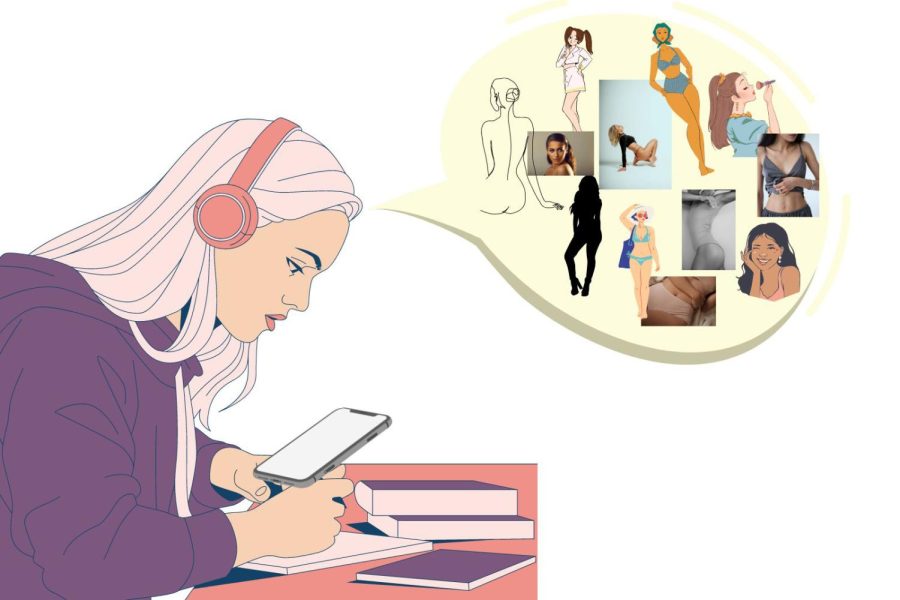Op-Ed: Instagram’s role in the growing rates of eating disorders in teenagers
Photo credit: Tavi Memoli
Instagram plays a large role in the growing rates of eating disorders in teenagers. As the app’s popularity exponentially increases among teenagers, the commonality of eating disorders in teens has risen as well. (Graphic illustration by Tavi Memoli)
May 28, 2023
Content Warning: This article mentions eating disorders. If you or anyone you know needs support, reach out to The National Eating Disorders Association by calling or texting 800-931-2237.
In the height of COVID-19, while I was stuck at home, I spent most of my time on Zoom and social media. It was the only way I felt connected to my friends, who quarantine had stripped away from me so suddenly. I sat on my phone for hours, scrolling through Instagram posts.
As my attention remained glued to the screen, I’d stare in awe at pictures of beautiful girls with “perfect” bodies. I soon began to notice an overwhelming number of workout and “healthy” lifestyle videos all over my Explore page.
I was obsessed, and the algorithm knew that. These posts started negatively impacting my mental and physical wellbeing, and my eating habits changed drastically. My diet consisted purely of smoothies, and because of the pressure I felt to look like the models flooding my Instagram feed, I skipped meals. I thought depriving myself of the one thing my body needed most would solve my aching desire for the “perfect” body.
As I continued to limit myself to smoothies and small portions, I got thinner and thinner, but no matter how thin I became, it was never enough. Not only was my body negatively impacted, but my self-esteem and happiness were quickly deteriorating. Despite my struggles, the Instagram algorithm continued to feed me these harmful posts, and my obsession with fitting into society’s beauty standards continued to grow.
I wasn’t alone. As I entered my freshman year of high school, I realized how many other girls my age were experiencing the same problem, and for many of them, obsessing over these models wasn’t enough. These posts were actually having a greater physical impact behind the scenes.
A 2019 study led by Dr. Simon M. Wilksch of Flinders University found that out of 534 girls, eating disorders “were reported by 51.7% of girls and 45.0% of boys, with strict exercise and meal skipping the most common. A total of 75.4% of girls and 69.9% of boys had at least one SM (social media) account.” This is alarming since the use of these social media platforms is becoming more and more prevalent in our society.
“The core cognitive [mental] component of disordered eating is the placing of great importance on one’s body shape, weight, food intake or exercise,” Wilksch wrote.
The pressure of creating a perfect image of oneself for society is especially relevant for teens. Beauty standards make it hard for teen consumers to feel accepted if they don’t embody modern-day ideals. Posts that project unrealistic body images acquire value through likes and comments. This form of validation can become obsessive for teens, leading to major health concerns such as eating disorders, while they attempt to conform to impractical standards in pursuit of society’s acceptance.
Researchers Alana Papageorgiou, Colleen Fisher and Donna Cross conducted an experiment in 2022 in Perth, Western Australia. They interviewed 24 girls, ranging from ages 14-17, on the impact of sexualized images on social media on their mental health. They found the majority of girls reported negatively comparing themselves to other images on social media.
According to the report, “Body dissatisfaction is an important element of body image and can range in severity from having a preference for different body characteristics to the uptake of extreme action to change one’s body.”
If social media platforms are negatively impacting your body image, it’s important to be aware of how their algorithms work. Instagram’s algorithm exposes consumers to specific posts that will grab their attention.
If you spend time on posts that uplift you, you’ll continue to see those types of posts. If you spend time on posts that project unrealistic body images, you’ll continue to see similar posts. If we can raise awareness about how algorithms function, we will be able to control the algorithm instead of letting the algorithm control us.









